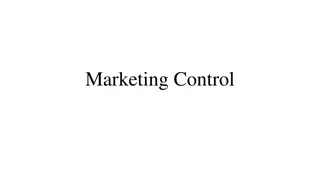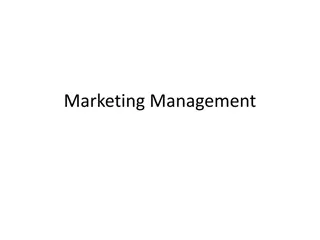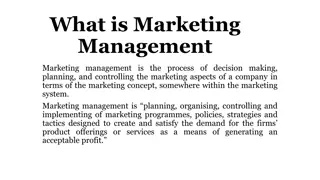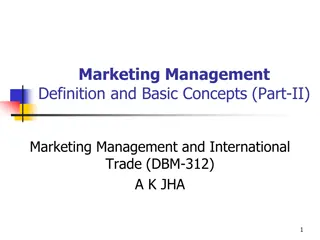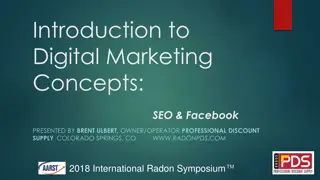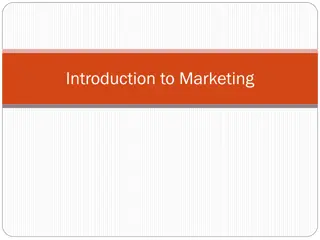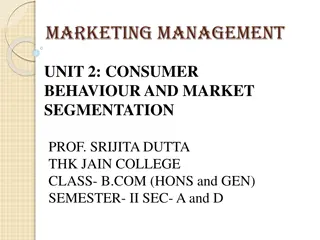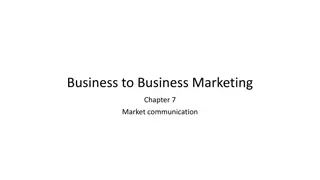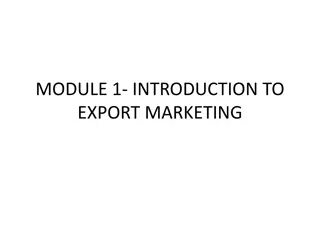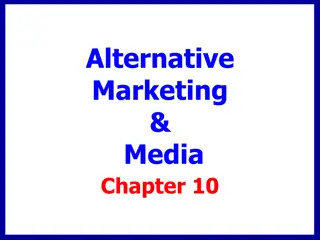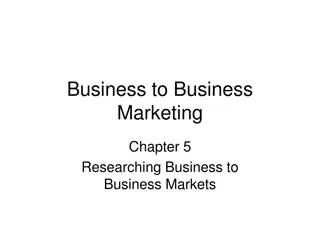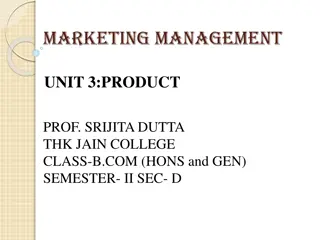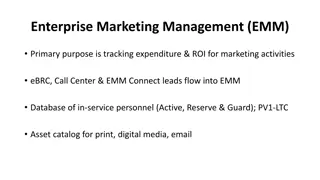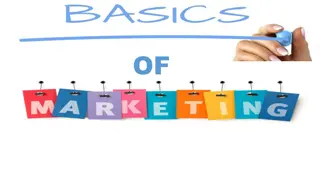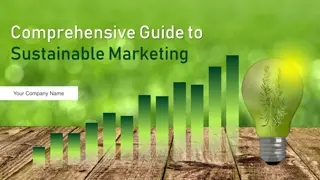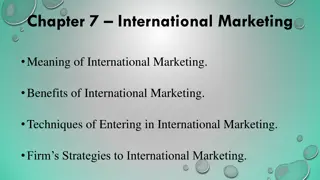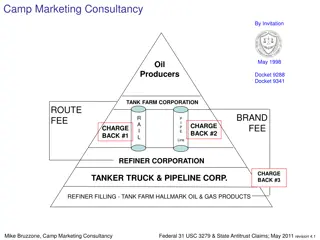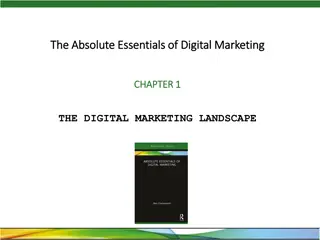Understanding Marketing and Management Concepts in Business
In the realm of business, marketing and management play crucial roles. Marketing is a social process focused on meeting customers' needs and wants through product offerings and exchanges, with selling being just a part of it. On the other hand, management involves planning, organizing, commanding, coordinating, and controlling activities to achieve desired goals. Marketing management seeks profitable opportunities by catering to consumer needs and addressing any service gaps. These concepts are fundamental in driving business success and customer satisfaction.
Download Presentation

Please find below an Image/Link to download the presentation.
The content on the website is provided AS IS for your information and personal use only. It may not be sold, licensed, or shared on other websites without obtaining consent from the author. Download presentation by click this link. If you encounter any issues during the download, it is possible that the publisher has removed the file from their server.
E N D
Presentation Transcript
Dr Prabhat K. Dwivedi Associate Professor Deptt. of Business Management, CSJM University, Kanpur, India Mob. 8795838165 Email: drprabhatkdwivedi@csjmu.ac.in
WHAT IS MARKETING? Social Definition of Marketing: Social Definition of Marketing:- - Marketing is a social process by which individuals and groups Marketing is a social process by which individuals and groups obtain what they need and want through creating, offering and obtain what they need and want through creating, offering and freely exchanging products and services of value with others. freely exchanging products and services of value with others. Managers sometimes think of marketing as the art of selling Managers sometimes think of marketing as the art of selling product but selling is only the tip of the Marketing iceberg. product but selling is only the tip of the Marketing iceberg. Peter Drucker, a leading management theorist puts it as: Peter Drucker, a leading management theorist puts it as:- -There will always, one can assume, be need for some selling. But the will always, one can assume, be need for some selling. But the aim of marketing is to make selling superfluous. The aim of aim of marketing is to make selling superfluous. The aim of Marketing is to know and understand the customer so well that Marketing is to know and understand the customer so well that the product or service fits him and sells itself. Ideally, marketing the product or service fits him and sells itself. Ideally, marketing should result in a customer who is ready to buy. All that should should result in a customer who is ready to buy. All that should be needed then is to make the product or service available. be needed then is to make the product or service available. There
WHAT IS MANAGEMENT? "Management is the art of knowing what you want to do and then seeing that they do it in the best and the cheapest may." Frederick Winslow Taylor (March 20, 1856 March 21, 1915) Henry Fayol To manage is to forecast and plan, to organize, to command, to coordinate, and to control. (1841-1925) Management is a multi-purpose organ that manages business and manages managers and manages workers and work. Peter Drucker (1909-2005)
WHAT IS MARKETING MANAGEMENT? Marketing management is the way to find out the opportunities which are profitable and create these opportunities by satisfying the customers. Marketing management is consumer-oriented. Therefore, the marketing manager has to find out the services that satisfy the consumers and the services that fail to meet the needs and expectations of consumers so that plus and delta can be developed to cover up the shortage.
WHAT IS MARKETED? Marketing people market 10 types of entities:- 1. Goods:- cars, televisions etc. 2. Services:- Work of airlines, hotels, car rental firms, etc. 3. Events:- Time based events. Ex:- Major Trade shows, Artistic Performances, etc. 4. Experiences:- An amusement Park or a Water Park, Theme Restaurant that creates the ambience of a village of a state, etc. 5. Person:- Celebrity Marketing is a major business. Ex:- Artistes, Musicians, CEOs, Sportspersons etc. 6. Places:- Cities, States, Regions and even whole nations compete actively to attract tourists, factories, Company Head Quarters, etc. Ex:- Bangaluru:-Silicon Valley of India. Tourism industry:- Kerela- Marketed as God s own country. Govt. of India Incredible India. 7. Properties:- Properties are Intangible rights of ownership of either real property (Real Estate) or Financial property (Stocks & Bonds)
8. Organizations:- Organizations also market themselves to build their image in the market. Ex:- Philips:- Sense the Simplicity campaign after research among the customers world wide. 9. Information:- Information can be about anything and everything. Ex:- Schools, Colleges, Hospitals, Packaging. 10. Ideas:- Every market offering includes a basic idea. Ex:- Charles Revson of Revlon once observed In the factory, we make cosmetics; in the store we sell hope . Even social marketers are now busy promoting such idea by creating awareness about AIDS, encouraging family planning and discouraging smoking.
WHY MARKETING? 6 Reasons Why Marketing is so Important 6 Reasons Why Marketing is so Important Marketing Sells Marketing Sells Competitive Advantage Competitive Advantage Business Expansion Business Expansion Efficiency Efficiency Customer Satisfaction Customer Satisfaction Brand Image Brand Image
TYPES OF DEMAND 1. Negative Demand:- Consumers dislike the product and may even pay a price to avoid it. 2.Nonexistent Demand:- Consumers may be unaware of or uninterested in the product. 3.Latent Demand:- Consumers may share a strong need that can not be satisfied with the existing product. 4.Declining Demand:- Consumers begin to buy the product less frequently or not at all. 5.Irregular Demand:- Consumer purchases vary on a Seasoned, monthly, weekly, daily or even hourly basis. 6.Full Demand:- Adequately buying all products put in the marketplace. 7.Over Full Demand:- More buyers than can be satisfied. 8.Unwholesome Demand:- Consumers may be attracted to products that have undesirable social consequences.


